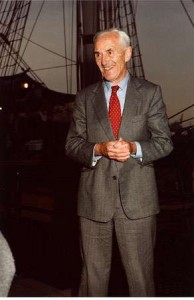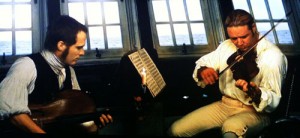 Today Mrs. T and I are vacationing on the coast of Maine. We’re also in the pleasant and singularly appropriate process of jointly rereading Patrick O’Brian’s twenty Aubrey-Maturin novels, which tell the fictional tale of how Jack Aubrey, a Royal Navy captain, and Stephen Maturin, his ship’s doctor and best friend, fought alongside one another in the Napoleonic Wars.
Today Mrs. T and I are vacationing on the coast of Maine. We’re also in the pleasant and singularly appropriate process of jointly rereading Patrick O’Brian’s twenty Aubrey-Maturin novels, which tell the fictional tale of how Jack Aubrey, a Royal Navy captain, and Stephen Maturin, his ship’s doctor and best friend, fought alongside one another in the Napoleonic Wars.
I paid tribute to these marvelous books when I reviewed The Yellow Admiral, the eighteenth title in the series, for the New York Times Book Review in 1996:
O’Brian’s present popularity is to some extent a fad, but it is also justified. To say that his books are a cut above the average historical novel is to miss the point: Aubrey and Maturin are to Capt. Horatio Hornblower what Philip Marlowe is to Perry Mason. Nor is his superiority merely a function of his ability to tell good stories in stylish prose. Having read the entire cycle more than once, I continue to be astonished by the breadth of O’Brian’s cultural awareness—among many other things, he writes about music with the knowledge and gusto of a highly cultivated amateur—and while he wears his learning lightly, it is central to the effect these wonderfully civilized books make. In The Letter of Marque (1990), for instance, Stephen Maturin and his wayward wife, Diana, reconcile in a scene modeled on the finale of The Marriage of Figaro, and the reference is not gratuitous: rather, it adds immeasurably to the richness of the novel’s emotional texture.
In the end, what makes the Aubrey-Maturin novels memorable is their moral gravity: rarely does one encounter in nominally popular fiction so Trollopian an understanding—and acceptance—of the divided nature of men’s souls. O’Brian does not deal in cardboard heroes, which is why the acts of heroism he describes make so powerful an impression. We read him for his plots; we reread him for his philosophy.
(By the way, I wonder to this day whether reading the last part of this review might possibly have inspired O’Brian to kill off Diana in The Hundred Days, the next installment in the series. Perhaps some future biographer will enlighten me!)
As I mentioned above, one of the aspects of the Aubrey-Maturin novels that I find especially diverting is the intelligence and sympathy with which O’Brian portrays the amateur musicianship of Jack and Stephen, whose intimacy is rooted in part in their passion for playing the violin and cello together during their long ocean cruises. It also figures prominently in Peter Weir’s Master and Commander: The Far Side of the World, a 2003 film that is based on several of O’Brian’s novels, and adds much to that film’s excellence.
Most of the pieces that Jack and Stephen play in the novels are identified only by the composer’s name and, occasionally, their key signature, as in the case of their “often-played yet ever-fresh Corelli in C major.” In The Ionian Mission, though, O’Brian tells how Jack discovered a sheaf of forgotten manuscripts by Johann Sebastian Bach, among them the great D Minor Partita for unaccompanied violin, whose towering finale he describes with a penetration worthy of a first-class music critic.
I posted this passage as an almanac entry last year, but it’s worth repeating here:
Now when the fiddle sang at all it sang alone: but since Stephen’s departure he had rarely been in a mood for music and in any case the partita that he was now engaged upon, one of the manuscript works that he had bought in London, grew more and more strange the deeper he went into it. The opening movements were full of technical difficulties and he doubted he would ever be able to do them anything like justice, but it was the great chaconne which followed that really disturbed him. On the face of it the statements made in the beginning were clear enough: their closely argued variations, though complex, could certainly be followed with full acceptation, and they were not particularly hard to play; yet at one point, after a curiously insistent repetition of the second theme, the rhythm changed and with it the whole logic of the discourse. There was something dangerous about what followed, something not unlike the edge of madness or at least of a nightmare; and although Jack recognized that the whole sonata and particularly the chaconne was a most impressive composition he felt that if he were to go on playing it with all his heart it might lead him to very strange regions indeed.
 In addition, Jack and Stephen play a “D Minor double sonata” which is quite obviously a transcription for violin and cello of the Two-Violin Concerto, and once again O’Brian describes its finale so perceptively that those who know the piece will instantly recognize the passage he has in mind:
In addition, Jack and Stephen play a “D Minor double sonata” which is quite obviously a transcription for violin and cello of the Two-Violin Concerto, and once again O’Brian describes its finale so perceptively that those who know the piece will instantly recognize the passage he has in mind:
After a particularly difficult, severe and abstract passage the last movement ended with a triumphant summing-up and resolution that they could both play at first sight and that they repeated again and again; and the grave happiness of the music was still with Captain Aubrey when he walked on to his quarterdeck in the bright morning.
It happens that George Balanchine and Paul Taylor, the two greatest choreographers of the twentieth century, both made dances that were set to this movement, Balanchine in Concerto Barocco and Taylor in Esplanade. What’s more, Taylor is an O’Brian fan (he was, in fact, the “famous choreographer” to whom I referred in the first paragaph of my review of The Yellow Admiral).
I wish I’d thought to ask Taylor about this sentence from The Ionian Mission on one of the various occasions in the past when I interviewed him. I wouldn’t be at all surprised if he’d found the phrase “grave happiness” to be perfectly suited to much of Bach’s music, the finale of the Two-Violin Concerto most definitely included. I know I do.
* * *
The finale of Paul Taylor’s Esplanade, set to the third movement of Bach’s Two-Violin Concerto and performed on PBS’ Dance in America by the Paul Taylor Dance Company in 1977. The passage described by Patrick O’Brian in The Ionian Mission starts at 3:40:
A scene from Master and Commander: The Far Side of the World. The piece “played” by Russell Crowe and Paul Bettany is an excerpt from the finale of Mozart’s Third Violin Concerto, K. 215:


